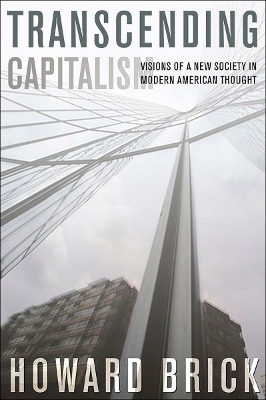
Transcending Capitalism
Cornell University Press (Verlag)
978-0-8014-2590-5 (ISBN)
- Lieferbar (Termin unbekannt)
- Versandkostenfrei innerhalb Deutschlands
- Auch auf Rechnung
- Verfügbarkeit in der Filiale vor Ort prüfen
- Artikel merken
In Transcending Capitalism, Howard Brick explains why many influential midcentury American social theorists came to believe it was no longer meaningful to describe modern Western society as "capitalist," but instead preferred alternative terms such as "postcapitalist," "postindustrial," or "technological." Considering the discussion today of capitalism and its global triumph, it is important to understand why a prior generation of social theorists imagined the future of advanced societies not in a fixed capitalist form but in some course of development leading beyond capitalism.
Brick locates this postcapitalist vision within a long history of social theory and ideology. He challenges the common view that American thought and culture utterly succumbed in the 1940s to a conservative cold war consensus that put aside the reform ideology and social theory of the early twentieth century. Rather, expectations of the shift to a new social economy persisted and cannot be disregarded as one of the elements contributing to the revival of dissenting thought and practice in the 1960s.
Rooted in a politics of social liberalism, this vision held influence for roughly a half century, from its interwar origins until the right turn in American political culture during the 1970s and 1980s. In offering a historically based understanding of American postcapitalist thought, Brick also presents some current possibilities for reinvigorating critical social thought that explores transitional developments beyond capitalism.
Howard Brick is Professor of History and Louis Evans Chair in U.S. History at the University of Michigan at Ann Arbor. He is the author of Age of Contradiction: American Thought and Culture in the 1960s, also from Cornell, and Daniel Bell and the Decline of Intellectual Radicalism: Social Theory and Political Reconciliation in the 1940s.
Introduction. To Name a New Society in the Making1. Capitalism and Its Future on the Eve of World War I2. The American Theory of Organized Capitalism3. The Interwar Critique of Competitive Individualism4. Talcott Parsons and the Evanescence of Capitalism5. The Displacement of Economy in an Age of Plenty6. The Heyday of Dynamic Sociology7. The Great ReversalConclusion. On Transitional Developments beyond CapitalismNotes
Index
| Erscheint lt. Verlag | 30.11.2006 |
|---|---|
| Verlagsort | Ithaca |
| Sprache | englisch |
| Maße | 155 x 235 mm |
| Gewicht | 907 g |
| Themenwelt | Sozialwissenschaften |
| ISBN-10 | 0-8014-2590-5 / 0801425905 |
| ISBN-13 | 978-0-8014-2590-5 / 9780801425905 |
| Zustand | Neuware |
| Haben Sie eine Frage zum Produkt? |
aus dem Bereich


